
Food allergies are complicated. It can be difficult for adults to fully understand them, so it’s no surprise that many parents struggle with how to help their little ones to understand them. In today’s post, we’ll cover some age-appropriate tips and resources to help you explain food allergies to your toddler or young child.
At this age, it’s best to keep things as simple as possible and use words they can understand. Some parents are comfortable with using simple terms like “safe foods” and “unsafe foods”. Other parents may wish to use words like “Yes/No” foods or “green light” and “red light” foods. Discuss with your healthcare professional or other parents of children with food allergies, as they may have good suggestions. In this guide we will use the words ‘safe’ and ‘unsafe’ to describe foods.
Help your child to understand that there are certain foods that will make him sick, using terms he knows (e.g. “This food will make your tummy hurt”), and certain foods that will not. Every child is different in his/her level of understanding. Ask your healthcare professional the best words to use to help your child to understand. The goal at this stage is to help teach your child to distinguish between the two and of course to prevent him from coming into contact with unsafe foods.
Basic points to communicate:
- You have food allergies and certain “unsafe foods” can make you very sick
- Do not eat, touch or smell any food until it has been approved by mom or dad (or a designated family member/caregiver).
- If your tummy hurts or you just feel funny, let a grown up know right away.
Although parents must be very vigilant at this age and control everything that their child eats, it’s important to begin teaching him to identify and avoid allergens on his own so that he will be ready when he gets older and you can’t be with him all the time.
As your child gets a little older, he may start asking more questions about food allergies and you can provide more details as you see appropriate. It can be difficult to adequately communicate the seriousness of food allergies without causing excessive anxiety. Remember, many children will outgrow their food allergies, and you don’t want them to be so afraid of that food when the time comes.
Reassure your child that as long as he is careful to avoid unsafe foods, there is nothing to worry about and remind him that there is an emergency plan to help him in case he does have an allergic reaction. Ensure that your child knows to tell an adult right away if he comes into contact with an unsafe food. Reassure him that he won’t be in trouble; Accidents happen.
Sometimes books, videos, music and games can help to communicate complex information to kids in ways that they understand. Check with your healthcare professional for recommendations – they may have great ideas! Here are some that you might find useful:
Storybooks:
Guide for preschoolers with peanut and tree nut allergies
Taking Food Allergies to School
Starting School With a Food Allergy
Videos:
Binky Goes Nuts (part of the Arthur series)
Music:
Kyle Dine is a musician who makes awesome educational music about food allergies. Check out his website: http://www.kyledine.com/music.html.
Games:
Back To School Interactive Game
Make your own food allergy education games. For example, print out pictures of safe and unsafe foods and put them on flashcards. Then have your child go through the cards and identify which ones are safe and unsafe. Another idea is to make a variation on the game “Where’s Waldo” and play “Find The Allergen” with examples of ingredient lists.
Do you have any tips or advice for explaining food allergies to little ones? What has worked or not worked for you? Please share!
–






